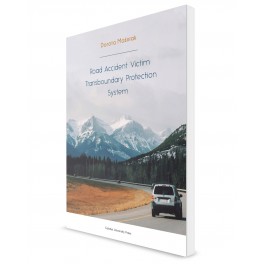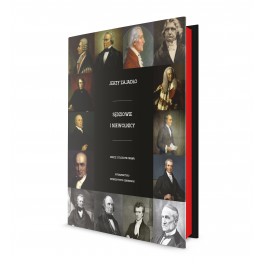Opis
Judges and Slaves. Sketches from the Philosophy of Law
Autor: Jerzy Zajadło
Wydawnictwo Uniwersytetu Gdańskiego
The central concerns of this study are court cases and the verdicts of the judges invo!ved in them. Its uniąueness in Poland resides in thefact that the author does not resthct himselfin his narrative to a presentation of judges’ views, but concentrates on court rulings. It, thus, brings Polish readers close to the essence of American jurisprudence. (…) Jerzy Zajadło convincing!y demonstrates the role ofideology, mostly that of natur al law, in slave cases heard in court, introducing thereby the exceptionally important concept of „judicial disobedience.” Further, the author shows how very often the issue ofslavery was only marginal – fundamentally, it was a matter of the interpretation ofthe Constitution (…). From this perspective, I see the main merit of Professor Zajadło’s work in the fact that it is basically a book about the law’s conservatism and about conflicts between the law and morality. Laws of naturę, customs, and interests all come into play, which, as a result, leads to a conflict between positive law and the morał reąuirement of disobedience. In Zajadło’s book, the dilemmas ofthe judge’s conscience are analyzed from all sides.
Professor Wiktor Osiatyński
Contents
Introduction
The Constitution – A Covenant with Death and an Agreement with Hell 9
1. Prosecutors, Vindicators, and Historicists 11
2. Thomas Jefferson: American Sphinx 17
3. A Pro-Slavery Constitution – Despite Everything 24
4. History and Paradigms 29
Chapter I
Justice William Murray, 1st Earl of Mansfield:
Somerset v. Stewart and Gregson v. Gilbert 37
1. Lord Mansfield 39
2. Somerset v. Stewart 47
3. The Massacre Aboard the Zong 52
Chapter I I
Justice William Cushing: Commonwealth v. Jennison 65
1. “A Mortal Wound” 67
2. The Quock Walker Cases 72
3. Four Riddles 75
4. The Paradigmatic Dimension 84
Chapter I I I
Justices George Wythe and St. George Tucker: Hudgins v. Wright 89
1. The Case of Hudgins v. Wright 91
2. George Wythe and St. George Tucker 95
Chapter IV
Justice John Marshall: The Case of The Antelope 101
1. The Sea and Slaves 103
2. The Case of La Jeune Eugenie 107
3. The Case of The Antelope 109
Chapter V
Justice Lemuel Shaw: Commonwealth v. Aves 115
1. Judicial Disobedience 117
2. Commonwealth v. Aves 122
3. Justice Lemuel Shaw 127
Chapter VI
Justices Thomas Ruffin and William Gaston: State v. Mann and State v. Will 133
1. Thomas Ruffin and William Gaston 135
2. State v. Mann and State v. Will 140
3. Pierre Bourdieu’s Reflexive Sociology 146
Chapter VII
Justice Joseph Story: Prigg v. Pennsylvania 155
1. The Fugitive Slave Clause in the 1787 Constitution 157
2. The Law on Fugitive Slaves of 1793 159
3. From Compromise to Conflict 162
4. The Paradigmatic Importance of the Verdict 163
5. The Facts and the Verdict 166
6. Justice Joseph Story 171
7. The Paradigmatic Dimension of Dilemmas of Judicial Conscience 177
Chapter VII I
Justice Joseph C. Hornblower:
State v. The Sheriff of Burlington and The New Jersey Slave Case 179
1. Chief Justice Joseph C. Hornblower 181
2. State v. the Sheriff of Burlington 186
3. The New Jersey Slave Case 189
Chapter IX
Justice Levi Woodbury: Jones v. Van Zandt 191
1. On the Subject of the Underground Railroad 193
2. The Literary Equivalent – John Van Trompe 198
3. Jones v. Van Zandt 201
4. Justice Levi Woodbury 203
Chapter X
Justice Roger B. Taney: Dred Scott v. Sandford 207
1. The Dred Scott v. Sandford Decision – Lawful or Shameful? 209
2. Who Was Dred Scott? 211
3. Promising but Ultimately Unfavorable Beginnings 214
4. The Tragic and Ultimately Unsuccessful Finale 216
5. Justice Roger B. Taney 219
Chapter XI
Justice John McLean and Justice Benjamin R. Curtis:
Dissenting Opinions in the Dred Scott v. Sandford Decision 225
1. Justice John McLean 227
2. Justice Benjamin R. Curtis 229
Chapter XI I
Justice Joseph Rockwell Swan: Oberlin – Wellington Rescue 233
1. The Unusual Oberlin College 235
2. Oberlin – Wellington Rescue 236
3. Two Different Reactions 238
4. The Trials 240
Chapter XI I I
Justice Abram D. Smith: Ableman v. Booth 243
1. The Defiant Citizens of Wisconsin 245
2. The Cases Booth I, Booth II and Booth III 248
3. The Ableman v. Booth Case 251
Epilog
The Thirteenth Amendment of the Constitution 253
Bibliograph y 263
Index of Persons 283
Index of Cases 288











Opinie
Na razie nie ma opinii o produkcie.